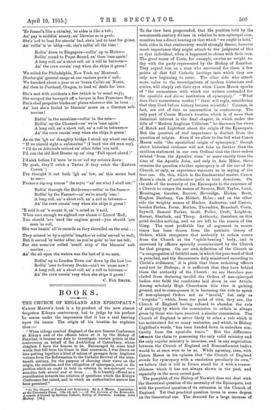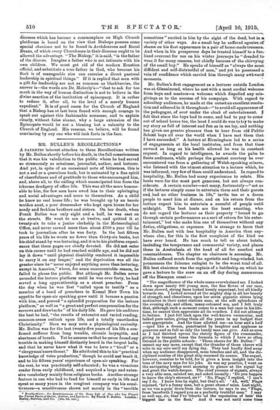BOOKS.
THE CHURCH OF ENGLAND AND EPISCOPACY.* CANON MASON'S book is a by-product of the now almost forgotten Kikuyu controversy, but to judge by his preface lie seems under the impression that it has a real bearing ripen its issues. The origin of his treatise he explains thus :—
"When tidings reached England of the now famous Conference at Kikuyu and of the offence taken at it by the Bishop of Zanzibar, it became my duty to investigate certain points in the -controversy on behalf of the Archbishop of Canterbury, whose chaplain I have the honour to be. Encouraged by some kind words that fell from his Grace in that connexion, I was drawn on into putting together a kind of catena of passages from Anglican writers from the Reformation to the Catholic Revival of the nine- teenth century, for the purpose of showing their views on the origin, the sanction, and the obligation of episcopacy, and on the position which we ought to hold in relation to non-episcopal com- munities both abroad and at home. . . . It is humbly offered as a -contribution towards the solution of questions which the Kikuyu Conference has raised, and to which an authoritative answer has been promised."
• (1) ma Church of England and Erioetypety. By A. J. Mason Cambridge at the 'University Prem. [70s. 64. set-1----(2) The Increase of the Episcopate. A epeech delivered by Bertram Pollock, Palmy of Norwich. London: John aforray. leeL3 To the view here propounded, that the position held by the seventeenth-century divines in relation to non-episcopal com- munities has a direct bearing on that which "we ought to hold," both sides in that controversy would strongly demur, however much importance they might attach to the judgment of this or that individual, when it happened to chime with their own. The great name of Cosin, for example, carries no weight to- day with the party represented by the Bishop of Zanzibar. They regard him as a man who recovered for them a few points of that full Catholic heritage into which they are only now beginning to enter. The other side, who attach more value to the investigations of modern historians and critics, will simply rub their eyes when Canon Mason speaks of "the earnestness with which our writers contended for the apostolic and divine institution of episcopacy." "What does their earnestness matter ? " these will reply, considering that they lived before history became scientific ! Catenas, in fact, are out of date as ammunition in controversy. The only part of Canon Mason's treatise which is of more than historical interest is the final chapter, in which under the title of "Modern Anglican Criticism" be discusses tbe views of Hatch and Lightfoot about the origin of the Episcopate. But the question of real importance is distinct from the question of origins. Even if we allow to the full what Canon Mason calls "the apostolical origin of episcopacy," though strict historical evidence will not take no further than the cautious statement in our own Ordinal that the three orders existed "from the Apostles' time," or more exactly from the time of the Apostle John, and only in Asia Minor, there remains the question whether episcopacy is of the ease of the Church, or only, ae experience warrants us in saying, of the been ease. On this, which is the fundamental matter, Canon Mason's chain of authorities pulls in both directions. On the side of the necessity of the Episcopate to the existence of a Church he ranges the names of Saravia, Hall. Taylor, Laud, Mountague, Garden, Barrow, Beveridge, Hickes, Brett, Hughes, Daubeny, Van Mildert, Heber; and on the other side the weighty names of Hooker, Andrewes, and !hasher, besides Forbes, Ferne, Morton, Thorndike, Bramhall, eosin, Saywell, Samuel Parker, Scott, Puller, Croft, Leighton, Burnet, Sherlock, and Thorp. Authority, therefore, on tide point decides nothing, and we are left to the reason of the thing. The most profitable line of argument in recent times has been drawn from the patristic theory of Orders, which recognizes that authority to ordain comes from the Church as the "spirit-bearing" body, and is exercised by officers specially commissioned by the Church for that purpose. On our own definition of the Church as "a congregation of faithful men, hi which the pure word of God is preached, and the Sacraments duly ministered according to Christ's ordinance," it is plain that these ordaining officers need not be Bishops ; it is sufficient that they hare behind them the authority of the Church we are therefore pre- cluded from declaring invalid the Orders of non-episcopal bodies who fulfil the conditions laid down in our Article. Among scholarly High Churchmen this view is gaining ground, and in consequence it is becoming the rule to speak of non-episcopal Orders not as "invalid," but only am " irregular" ; which, from our point of view, they are. the Church of England having refused to abandon the rule of antiquity by which the commission to ordain is always given by those who have received a similar commission. The Church of England is never likely to relax a ride which it has maintained for so many centuries, and which, in Bishop Lightfoot's words, "has been handed down in unbroken con- tinuity from the apostolic times." But the difference between the claim to possessing the only valid ministry and the only regular ministry is immense, and in any negotiation between the Church of England and Nonconformist bodies would be at ones seen to be so. While agreeing, then, with Canon Mason in his opinion that "the Church of England atands for episcopacy with a resolution peculiarly its own," we believe that it will in future stand for it with a reason- ableness which it has not always shown in the past, and especially in the more recent past.
The pamphlet of the Bishop of Norwich does not deal with the theoretical question of the necessity of the Episcopate. but with the practical question of its extension in the Church of England. Yet that practical question turns in some degree on the theoretical one. The demand for a large increase of
dioceses which has become a commonplace on High Church platforms is based on the view that Bishops possess some special charisma not to be found in Archdeacons and Rural Deans, of which every Churchman in their dioceses ought to be allowed the advantage. 'The Bishop," it is said. "is the father of the diocese. Imagine a father who is not intimate with his own children. We must get rid of the modern Erastian official, and substitute a true father in God, who because his flock is of manageable size can exercise a direct pastoral leadership in spiritual things." If it is replied that men with a gift for leadership are not as common as blackberries, the answer is—the words are Dr. Moberly's—" that to ask for too much in the way of human distinction is not to believe in the divine sanction of the institution of episcopacy. It is rather to reduce it, after all, to the level of a merely human expedient." It is of good omen for the Church of England that a Bishop has at last been found with enough courage to speak out against this fashionable nonsense, and to e,aplain clearly, without false shame, why a large extension of the Episcopate would be not a blessing but a calamity to the Church of England. His reasons, we believe, will be found convincing by any one who will look facts in the face.







































 Previous page
Previous page